- Clone
- RPA-2.10 (See other available formats)
- Regulatory Status
- RUO
- Workshop
- IV T085
- Other Names
- LFA-2, T11, SRBC-R
- Isotype
- Mouse IgG1, κ
- Ave. Rating
- Submit a Review
- Product Citations
- publications
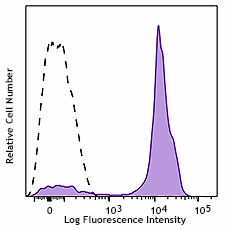
-

Human peripheral blood lymphocytes were stained with CD2 (clone RPA-2.10) PerCP/Cyanine5.5 (filled histogram) or mouse IgG1, κ PerCP/Cyanine5.5 isotype control (open histogram).
| Cat # | Size | Price | Quantity Check Availability | Save | ||
|---|---|---|---|---|---|---|
| 300215 | 25 tests | 112 CHF | ||||
| 300216 | 100 tests | 288 CHF | ||||
CD2 is a 50 kD type I transmembrane glycoprotein also known as LFA-2, T11, and sheep red blood cell receptor (SRBC-R). This immunoglobulin superfamily member is expressed on thymocytes, T lymphocytes, NK cells, and thymic B cell subsets. The major ligand for CD2 is CD58 (also known as LFA-3). CD2 has also been reported to bind CD48, CD59, and CD15. CD2 plays a critical role in alternative T cell activation, T cell signaling, and cell-cell adhesion.
Product DetailsProduct Details
- Verified Reactivity
- Human, Cynomolgus, Rhesus
- Reported Reactivity
- African Green, Baboon, Capuchin Monkey, Chimpanzee, Pigtailed Macaque, Pig
- Antibody Type
- Monoclonal
- Host Species
- Mouse
- Formulation
- Phosphate-buffered solution, pH 7.2, containing 0.09% sodium azide and BSA (origin USA)
- Preparation
- The antibody was purified by affinity chromatography and conjugated with PerCP/Cyanine5.5 under optimal conditions.
- Concentration
- Lot-specific (to obtain lot-specific concentration and expiration, please enter the lot number in our Certificate of Analysis online tool.)
- Storage & Handling
- The antibody solution should be stored undiluted between 2°C and 8°C, and protected from prolonged exposure to light. Do not freeze.
- Application
-
FC - Quality tested
- Recommended Usage
-
Each lot of this antibody is quality control tested by immunofluorescent staining with flow cytometric analysis. For flow cytometric staining, the suggested use of this reagent is 5 µl per million cells in 100 µl staining volume or 5 µl per 100 µl of whole blood.
* PerCP/Cyanine5.5 has a maximum absorption of 482 nm and a maximum emission of 690 nm. - Excitation Laser
-
Blue Laser (488 nm)
- Application Notes
-
Additional reported applications (for the relevant formats) include: immunohistochemical staining of acetone-fixed frozen tissue sections6 and blocking of T cell activation2. The Ultra-LEAF™ purified antibody (Endotoxin <0.1 EU/µg, Azide-Free, 0.2 µm filtered) is recommended for functional assays (Cat. Nos. 300239 & 300240).
-
Application References
(PubMed link indicates BioLegend citation) -
- Knapp W, et al. Eds. 1989. Leucocyte Typing IV. Oxford University Press. New York.
- Aversa G, et al. 1987. Transplant. Proc. 19:277. (Block)
- Zaretsky AG, et al. 2009. J. Exp Med. 206:991. (IHC) PubMed
- Perona-Wright G, et al. 2010. Nat. Immunol. 11:520. (FC) PubMed
- Thummler K, et al. 2010. J. Leukoc. Biol. 88:1041.
- Kap Y, et al. 2009. J. Histochem. Cytochem. 57:1159. (IHC)
- Yoshino N, et al. 2000. Exp. Anim. (Tokyo) 49:97. (FC)
- Product Citations
-
- RRID
-
AB_2561923 (BioLegend Cat. No. 300215)
AB_2561923 (BioLegend Cat. No. 300216)
Antigen Details
- Structure
- Ig superfamily, type I transmembrane glycoprotein, 50 kD
- Distribution
-
T cells, NK cells, thymocytes, and thymic B cell subsets
- Function
- T cell activation, adhesion
- Ligand/Receptor
- CD58 (LFA-3), CD48, CD59, CD15
- Cell Type
- B cells, NK cells, T cells, Thymocytes
- Biology Area
- Costimulatory Molecules, Immunology
- Molecular Family
- Adhesion Molecules, CD Molecules
- Antigen References
-
1. Bell G, et al. 1995. J. Immunol. 155:2805.
2. Bierer B, et al. 1989. Annu. Rev. Immunol. 7:579.
3. Moingeon P, et al. 1989. Immunol. Rev. 111:111. - Gene ID
- 914 View all products for this Gene ID
- Specificity (DOES NOT SHOW ON TDS):
- CD2
- Specificity Alt (DOES NOT SHOW ON TDS):
- CD2
- App Abbreviation (DOES NOT SHOW ON TDS):
- FC
- UniProt
- View information about CD2 on UniProt.org
Related FAQs
- How stable is PerCP/Cyanine5.5 tandem as compared to PerCP alone?
-
PerCP/Cyanine5.5 is quite photostable and also better than PerCP alone in withstanding fixation.
Other Formats
View All CD2 Reagents Request Custom Conjugation| Description | Clone | Applications |
|---|---|---|
| Biotin anti-human CD2 | RPA-2.10 | FC |
| FITC anti-human CD2 | RPA-2.10 | FC |
| PE anti-human CD2 | RPA-2.10 | FC |
| PE/Cyanine5 anti-human CD2 | RPA-2.10 | FC |
| Purified anti-human CD2 | RPA-2.10 | FC,IHC-F |
| APC anti-human CD2 | RPA-2.10 | FC |
| PerCP/Cyanine5.5 anti-human CD2 | RPA-2.10 | FC |
| Brilliant Violet 510™ anti-human CD2 | RPA-2.10 | FC |
| APC/Cyanine7 anti-human CD2 | RPA-2.10 | FC |
| PE/Cyanine7 anti-human CD2 | RPA-2.10 | FC |
| Brilliant Violet 605™ anti-human CD2 | RPA-2.10 | FC |
| PE/Dazzle™ 594 anti-human CD2 | RPA-2.10 | FC |
| APC/Fire™ 750 anti-human CD2 | RPA-2.10 | FC |
| Brilliant Violet 421™ anti-human CD2 | RPA-2.10 | FC |
| Pacific Blue™ anti-human CD2 | RPA-2.10 | FC |
| Alexa Fluor® 700 anti-human CD2 | RPA-2.10 | FC |
| Brilliant Violet 711™ anti-human CD2 | RPA-2.10 | FC |
| Brilliant Violet 785™ anti-human CD2 | RPA-2.10 | FC |
| Ultra-LEAF™ Purified anti-human CD2 | RPA-2.10 | FC,IHC-F |
| Alexa Fluor® 647 anti-human CD2 | RPA-2.10 | FC |
Customers Also Purchased
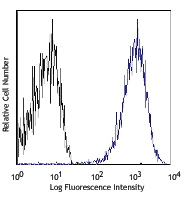
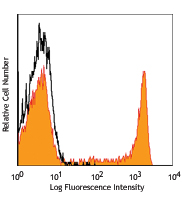
Compare Data Across All Formats
This data display is provided for general comparisons between formats.
Your actual data may vary due to variations in samples, target cells, instruments and their settings, staining conditions, and other factors.
If you need assistance with selecting the best format contact our expert technical support team.
-
Biotin anti-human CD2
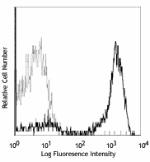
Human peripheral blood lymphocytes stained with biotinylated... -
FITC anti-human CD2
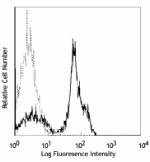
Human peripheral blood lymphocytes stained with RPA-2.10 FIT... -
PE anti-human CD2
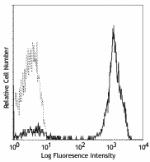
Human peripheral blood lymphocytes stained with RPA-2.10 PE -
PE/Cyanine5 anti-human CD2
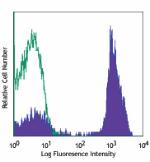
Human peripheral blood lymphocytes stained with RPA-2.10 PE/... -
Purified anti-human CD2
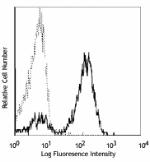
Human peripheral blood lymphocytes stained with purified RPA... -
APC anti-human CD2
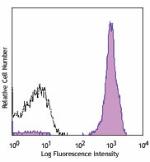
Human peripheral blood lymphocytes stained with CD2 (clone R... -
PerCP/Cyanine5.5 anti-human CD2
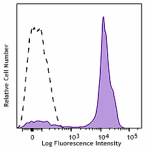
Human peripheral blood lymphocytes were stained with CD2 (cl... -
Brilliant Violet 510™ anti-human CD2
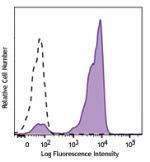
Human peripheral blood lymphocytes stained with CD2 (clone R... -
APC/Cyanine7 anti-human CD2
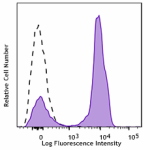
Human peripheral blood lymphocytes were stained with CD2 (cl... -
PE/Cyanine7 anti-human CD2
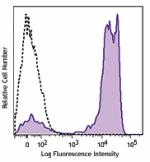
Human peripheral blood lymphocytes were stained with CD2 (cl... -
Brilliant Violet 605™ anti-human CD2
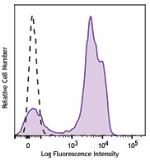
Human peripheral blood lymphocytes were stained with CD2 (cl... -
PE/Dazzle™ 594 anti-human CD2
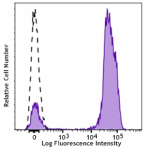
Human peripheral blood lymphocytes stained with CD2 (clone R... -
APC/Fire™ 750 anti-human CD2
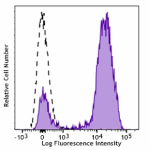
Human peripheral blood lymphocytes stained with CD2 (clone R... -
Brilliant Violet 421™ anti-human CD2
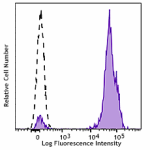
Human peripheral blood lymphocytes stained with CD2 (clone R... -
Pacific Blue™ anti-human CD2

Human peripheral blood lymphocytes were stained with CD3 APC... -
Alexa Fluor® 700 anti-human CD2

Human peripheral blood lymphocytes were stained with CD3 PE ... -
Brilliant Violet 711™ anti-human CD2

Human peripheral blood lymphocytes were stained with CD3 PE ... -
Brilliant Violet 785™ anti-human CD2

Human peripheral blood lymphocytes were stained with CD3 PE ... -
Ultra-LEAF™ Purified anti-human CD2
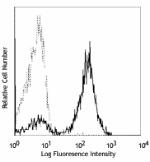
Human peripheral blood lymphocytes stained with LEAF™ purifi... -
Alexa Fluor® 647 anti-human CD2

Human peripheral blood lymphocytes were stained with anti-hu...
 Login / Register
Login / Register 










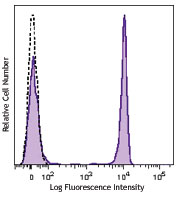
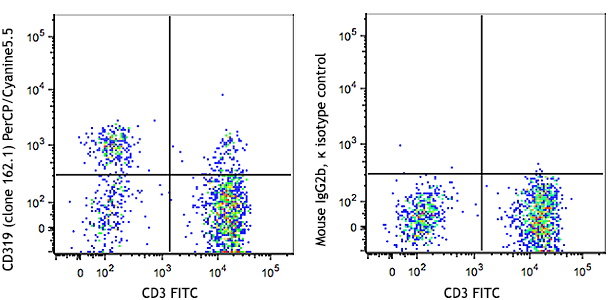



Follow Us